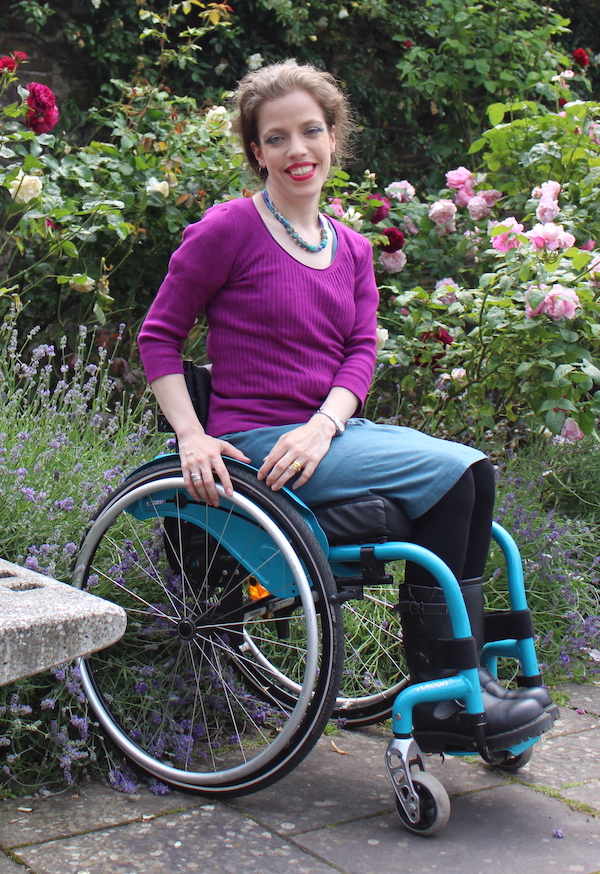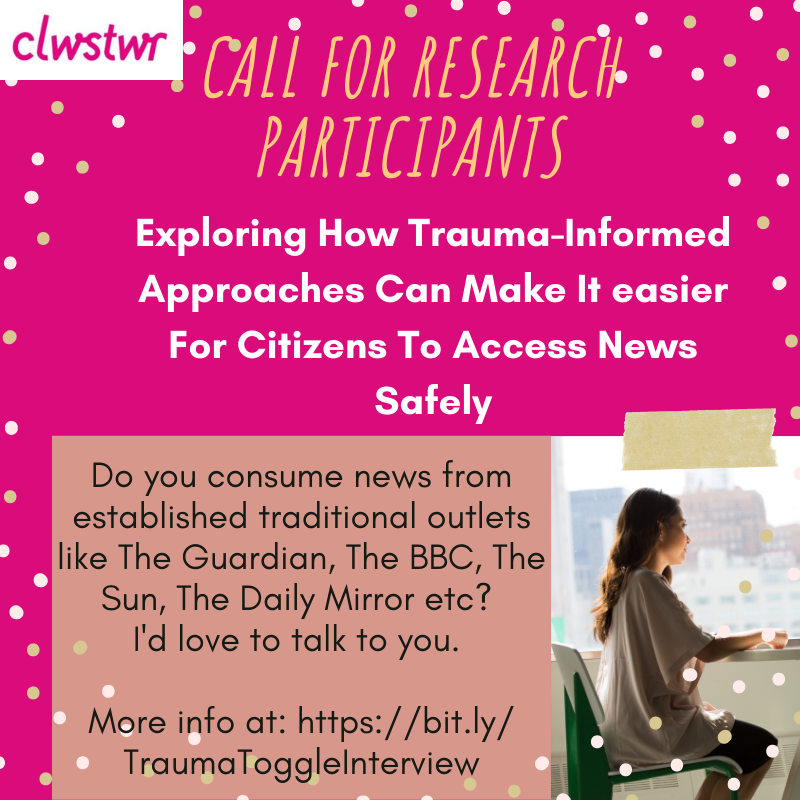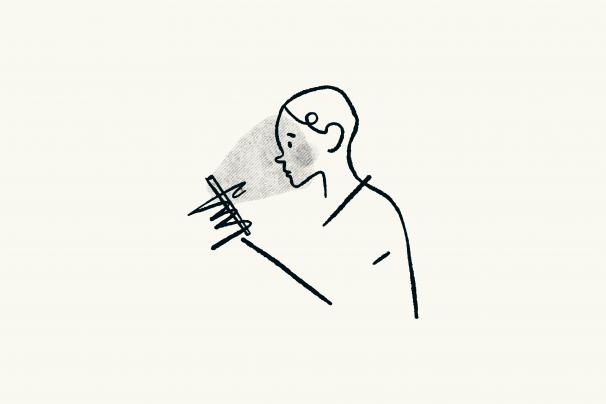Project Aim
Call for Research Particpants!
Would accessing news with Trauma Toggle make it easier for citizens to consume news safely?
Project information sheet
Thank you for your consideration and interest in my research and development. I am Grace Quantock, a researcher with Clwstwr Creu. This research project is part of my research and development in news and trauma. I am a counsellor, writer and researcher and my focus is working with clients with multiple marginalised identities and working safely with embodiment after trauma.
What is the research project about?
I am exploring how news can be accessed without re-traumatisation and distress. Much research focus has looked at the effective news delivery for engagement. I am researching how therapeutic principals can impact how people with trauma can access potentially triggering news safely.
This research has applications beyond news delivery, due to the Covid-19 pandemic, shifts to telemedicine have rapidly accelerated. With the delivery of more and more distressing information being online, this is a rich opportunity to understand how difficult material can be delivered in a format which makes it possible to process it.
What would my involvement mean for me?
I am inviting people who take in news who fit the following criteria to participate in an hour long, semi-structured interview:
People who:
- Consume news from established traditional outlets like The Guardian, The BBC, The Sun, The Daily Mirror and more.
- Accessing news through visiting the news outlet’s website.
- Reading news both on a desktop and a mobile.
- May have experience of finding news distressing due to personal history or situations.
For these interviews, I will ask for your thoughts and experiences on how you access news, what works best for you and and ask you to look through a mock-up of a news delivery website layout. I will ask your thoughts, experiences, concerns and needs in relation to this.
The interview will be conducted via Zoom, and last approximately 1 hour. The interview will be audio-recorded and a full, anonymised transcript will be produced. This means that you will not be identified or identifiable from the transcript.
What will happen to the information I provide during the interview?
Following the semi-structured interview, the audio-recording will be stored securely on a password-protected computer drive.
Please note that due to impairment reasons, I may not personally transcribe the interview audio. I will send the audio recording to a reputable transcription service. They will handle it securely and confidentially. Any questions about this, or if you need more information please just let me know.
After transcription, I will email you a password protected file of the transcript through a secure file sharing service. You will be able to look it over and correct or clarify anything you need to. After you’ve confirmed the transcript, I will delete the audio recording.
What are the benefits of taking part in this research?
My hope is that this research can contribute to more inclusive delivery of news. The journalism and media delivery professions have traditionally not widely engaged in inclusive delivery. But as news becoming more distressing and with the trauma load of the pandemic and other crises, the questions become more necessary.
This research has applications beyond news delivery, due to the Covid-19 pandemic shifts to telemedicine have rapidly accelerated. After my research is complete, I can send you a copy of my report, if you would like to request one.
Are there any risks to taking part in the research?
The research will be conducted online, via secure videoconferencing platform and therefore covid secure. I won’t be asking for any personal data, just about your experiences of accessing news, the website mock up, what works and what has been challenging, as well as how you have navigated those challenges. You don’t have to answer any questions you don’t want to, the conversation will be respectful of your time and experiences.
Can I change my mind about participating?
Yes, you can withdraw from the study at any time without any issues, and there is no need to explain why. Just let me know you want to withdraw. You can leave the interview, or email me and let me know you don’t want to continue. You can also withdraw your data, the information you’ve shared with me that will be contained in the transcript of our interview. However, after the data has been analysed, I can’t withdraw yours as I won’t be able to identify whose is whose. I will let you know by email the date this will be well in advance.
Who do I contact if I have any questions about the research project?
If you have questions or concerns about any aspect of the research, please just email me: grace@gracequantock.com
Next Step
Please fill in the form here to register your interest if you'd like to participate in Grace's research and would like more information.
You can read more about the research here: https://bit.ly/TraumaToggleResearch
Trauma Toggle will allow users to titrate language and triggering material to control their media consumption. With climate breakdown, COVID-19, political upheaval and worsening mental health, Trauma Toggle aims to increase citizen engagement, reducing news avoidance and vulnerability to predatory misinformation. Grace Quantock is combining real world clinical experience as a psychotherapeutic counsellor and will co-create with journalists working in the field, marginalised audiences and technological developers to create a news prototype that's trauma informed.



